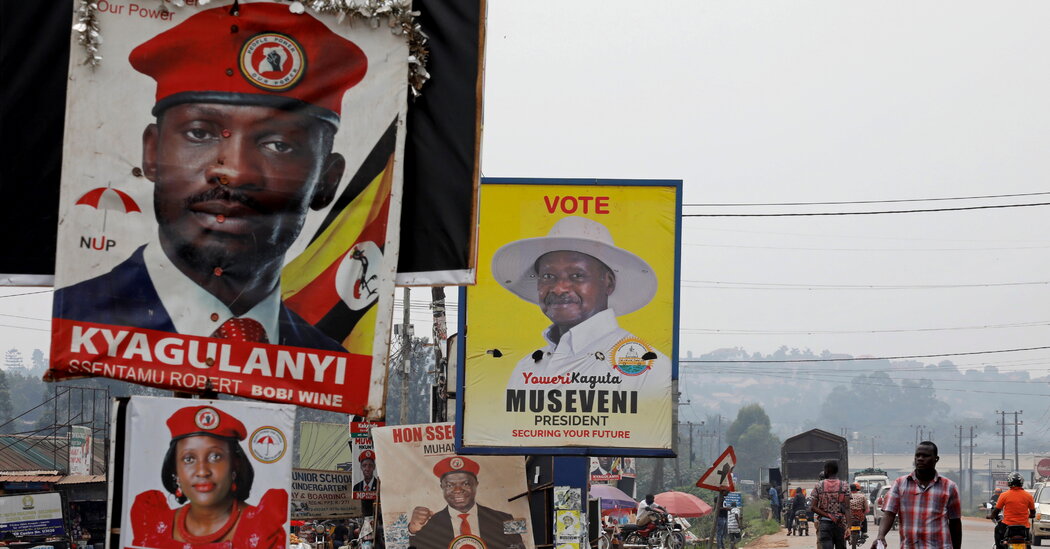NAIROBI, Kenya — Uganda’s president has blocked Facebook from operating in his country, just days after the social media company removed fake accounts linked to his government ahead of a hotly contested general election set to take place on Thursday.
In a televised address late on Tuesday night, President Yoweri Museveni accused Facebook of “arrogance” and said he had instructed his government to close the platform, along with other social media outlets.
“That social channel you are talking about, if it is going to operate in Uganda, it should be used equitably by everybody who has to use it,” Mr. Museveni said. “We cannot tolerate this arrogance of anybody coming to decide for us who is good and who is bad,” he added.
The ban on Facebook comes at the end of an election period that has been dogged by a crackdown on the political opposition, harassment of journalists and nationwide protests that have led to at least 54 deaths and hundreds of arrests, according to officials.
Mr. Museveni, 76, who is running for a sixth term in office, is facing 10 rivals, including the rapper-turned-lawmaker Bobi Wine, 38. Mr. Wine, whose real name is Robert Kyagulanyi, has been beaten, sprayed with tear gas and charged in court with allegedly flouting coronavirus rules while on the campaign trail.
Last week, Mr. Wine filed a complaint with the International Criminal Court accusing Mr. Museveni and other top current and former security officials of sanctioning a wave of violence and human rights violations against citizens, political figures and human rights lawyers.
Facebook announced this week that it had taken down a network of accounts and pages in the East African nation that engaged in what it called “coordinated inauthentic behavior” aimed at manipulating public debate around the election. The company said the network was linked to the Government Citizens Interaction Center, an initiative that is part of Uganda’s Ministry of Information and Communications Technology and National Guidance.
In a statement, a Facebook spokesperson said the network “used fake and duplicate accounts to manage pages, comment on other people’s content, impersonate users, re-share posts in groups to make them appear more popular than they were.”
Facebook’s investigation into the network began after research from the Atlantic Council’s Digital Forensic Research Lab showcased a network of social media accounts that had engaged in a campaign to criticize the opposition and promote Mr. Museveni and the governing party, the National Resistance Movement. After the research was published, Twitter also said it had shut down accounts linked to the election.
Hours before Mr. Museveni’s speech, social media users across Uganda confirmed restrictions on their online communications, with the digital rights group NetBlocks reporting that platforms including Facebook, WhatsApp, Instagram and Twitter had been affected.
Uganda blocked the internet during its 2016 elections, and in 2018, it introduced a social media tax aimed at raising revenue and curbing what the government called online “gossip.” The move, which was criticized as a threat to freedom of expression, had a negative effect on internet use over all, with millions of Ugandans giving up internet services altogether.
In anticipation of another shutdown this week, a group of organizations that work to end internet cutoffs worldwide sent a letter to Mr. Museveni and the leaders of telecom companies in Uganda pleading with them to keep the internet and social media platforms accessible during the election.
Mr. Museveni did not heed their call. On Tuesday night, he said the decision to block Facebook was “unfortunate” but “unavoidable.”
“I am very sorry about the inconvenience,” he said, adding that he himself had been using the platform to interact with young voters. He has almost a million followers on Facebook and two million on Twitter.
Striking a defiant note, Mr. Museveni said that if Facebook was going to “take sides,” then it would not be allowed to operate in the country.
“Uganda is ours,” he said.






